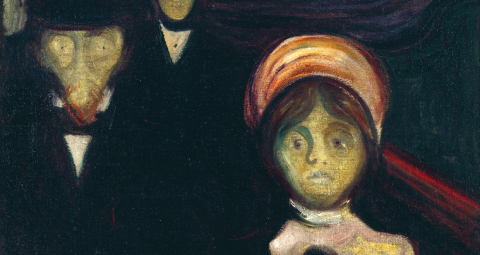January 10 | ![]() 0 COMMENTS
0 COMMENTS ![]() print
print

Finding consolation through God in a world of anxiety
Colette Cooper reflects on the importance of looking after our mental health.
As a young Catholic who regularly experiences regular anxiety, I have began to realise that Faith and mental health can often impact one another. Sometimes, it gives me peace and comfort knowing that I am supported by God and I can pray in times of need. While at other times, I feel as if I’m abandoning God if I go and seek help elsewhere.
Perhaps Catholic guilt becomes muddled up with anxiety. For instance, we may start to believe that our anxieties are flaws in our character; I sometimes worry that seeking help outside of spiritual guidance is a lack of trust in God—but I know that this is simply not the case.
So, how do we go about looking after our mental health as Catholics?
One Catholic issue that may have an impact on our mental health is the concern over our ‘inner lives.’
Absence
The way we feel, our thoughts and parts of us that aren’t observed by others, for example. As Catholics, we may often want to try to figure out why we feel an absence from God, which may lead to more stress, anxiety, doubt or depression.
Additionally, religious people tend to have an urge for purification, and although we pray, sometimes this may not feel enough to change our state of mind at that moment in time.
This isn’t to say that prayer doesn’t work, but it’s about getting the balance between trusting in prayer, seeking professional help if needed, and talking it out with others.
Of course, it is possible to live a fulfilling and happy life with a mental illness. The downside is, it makes some days tougher than others, and our Faith can both ease and sometimes, in a way, add to our pain. The stronger a Faith in God we have, for instance, the closer we want to feel to Him, and our anxieties may make us doubt our Faith.
Guilt
We should remember, however, that our mental illnesses do not make us sinners. As C.S. Lewis once wrote: “Some people feel guilty about their anxieties and regard them as a defect of Faith. I don’t agree at all. They are afflictions, not sins. Like all afflictions, they are, if we can so take them, our share in the Passion of Christ.”
Let’s also consider the saints for example, many of whom suffered from mental health problems, but still continued to have undeniable Faith and trust in God.
According to an article online, one of the saints who faced the burdens of mental illness was Blessed Clara Isabella Fornari, who experienced visions of Jesus, Mary, St Clare of Assisi and St Catherine, as well as the stigmata, the wounds of Christ.
Reportedly, she also suffered from suicidal thoughts and depression, although she was close to God. Eventually, however, the beauty of her visions returned before her death.
Suffering
This example shows that, although we sometimes must suffer, we are never truly alone or distant from God. St Pope John Paul II assured people who suffer from mental illnesses of their worth at the
International Conference for Health Care Workers on November 30, 1996, when he spoke on ‘Illnesses of the Human Mind.’
He said: “Whoever suffers from mental illness always’ bears God’s image and likeness in themselves, as does every human being. In addition, they always have the inalienable right not only to be considered as an image of God and therefore as a person, but also to be treated as such.”
Another Catholic fear which may impact our mental health is concern over our souls. When a loved one dies, for example, we pray that their soul will reach the joys of heaven.
While the concern for your soul may lead to an emphasis on our fears, it’s important to remember to trust in prayer, to trust that our grieving will pass, and God is with us.
Chaplaincies
Last year, in the run-up to World Mental Health Day, chaplains and mental health advocates highlighted the role that chaplaincies can play in helping students with mental health problems.
For instance, young people must face the pressures of growing up and finding themselves, which may impact their mental health. For me, life after university became quite tricky to process, particularly as my friends were moving on to different things.
According to one online article, “the World Health Organisation survey, completed by almost 14,000 students, suggests major depression and anxiety are the most prevalent mental illnesses in young people, while a YouGov poll on psychosis indicated that only a third of young people would know where to seek help if they or someone they know was suffering from [one of these] conditions.”
Crisis
Chaplains and mental health advocates have highlighted, however, that Catholic chaplaincies can help combat the mental health crisis facing young people and ‘save lives.’
Ultimately, by joining others who are going through similar experiences, this shows that no one is ever alone in their journeys, whatever it is they’re facing. It’s important not to suffer in silence, as well as to continue to trust in Him.
As the Bible says: “Come to Me, all who are weary and heavy-laden, and I will give you rest. Take My yoke upon you and learn from Me, for I am gentle and humble in heart, and you will find rest for your souls. For My yoke is easy and My burden is light.” (Matthew 11:28-30.)










